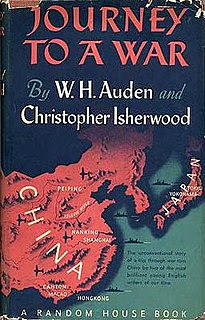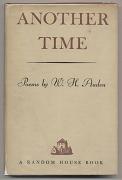
Wystan Hugh Auden was a British-American poet. Auden's poetry was noted for its stylistic and technical achievement, its engagement with politics, morals, love, and religion, and its variety in tone, form, and content. Some of his best known poems are about love, such as "Funeral Blues"; on political and social themes, such as "September 1, 1939" and "The Shield of Achilles"; on cultural and psychological themes, such as The Age of Anxiety; and on religious themes such as "For the Time Being" and "Horae Canonicae".

Christopher William Bradshaw Isherwood was an Anglo-American novelist, playwright, screenwriter, autobiographer, and diarist. His best-known works include Goodbye to Berlin (1939), a semi-autobiographical novel which inspired the musical Cabaret, A Single Man (1964) adapted as a film by Tom Ford in 2009, and Christopher and His Kind (1976), a memoir which "carried him into the heart of the Gay Liberation movement".

Edward Falaise Upward, FRSL was a British novelist and short story writer who, prior to his death, was believed to be the UK's oldest living author. Initially gaining recognition amongst the Auden Group as a highly imaginative surrealist writer, in the 1930s he joined the Communist Party of Great Britain, after which his writing shifted towards Marxist realism. His literary career spanned over eighty years.

"Musée des Beaux Arts" is a poem written by W. H. Auden in December 1938 while he was staying in Brussels, Belgium, with Christopher Isherwood. It was first published under the title "Palais des beaux arts" in the Spring 1939 issue of New Writing, a modernist magazine edited by John Lehmann. It next appeared in the collected volume of verse Another Time, which was followed four months later by the English edition. The poem's title derives from the Musées Royaux des Beaux-Arts de Belgique in Brussels, famous for its collection of Early Netherlandish painting. Auden visited the Musée and would have seen a number of works by the "Old Masters" of his second line, including Pieter Bruegel the Elder.

St Edmund's School is a coeducational nursery, pre-prep, preparatory and Senior school located in the village of Hindhead, around 10.5 miles south-west from the town of Guildford, in Surrey. It was founded in Hunstanton, Norfolk, in 1874.
"September 1, 1939" is a poem by W. H. Auden written on the outbreak of World War II. It was first published in The New Republic issue of 18 October 1939, and in book form in Auden's collection Another Time (1940).
"Funeral Blues", or "Stop all the clocks", is a poem by W. H. Auden which first appeared in the 1936 play The Ascent of F6. Auden substantially rewrote the poem several years later as a cabaret song for the singer Hedli Anderson. Both versions were set to music by the composer Benjamin Britten. The second version was first published in 1938 and was titled "Funeral Blues" in Auden's 1940 Another Time. The poem experienced renewed popularity after being read in the film Four Weddings and a Funeral (1994), which also led to increased attention on Auden's other work. It has since been cited as one of the most popular modern poems in the United Kingdom.

The Shield of Achilles is a poem by W. H. Auden first published in 1952, and the title work of a collection of poems by Auden, published in 1955. It is Auden's response to the detailed description, or ekphrasis, of the shield borne by the hero Achilles in Homer's epic poem the Iliad.
The Auden Group or the Auden Generation is a group of British and Irish writers active in the 1930s that included W. H. Auden, Louis MacNeice, Cecil Day-Lewis, Stephen Spender, Christopher Isherwood, and sometimes Edward Upward and Rex Warner. They were sometimes called simply the Thirties poets.

The Dog Beneath the Skin, or Where is Francis? A Play in Three Acts, by W. H. Auden and Christopher Isherwood, was the first Auden-Isherwood collaboration and an important contribution to English poetic drama in the 1930s. It was published in 1935 and first performed by the Group Theatre in 1936.

The Ascent of F6: A Tragedy in Two Acts, by W. H. Auden and Christopher Isherwood, was the second and most successful play in the Auden-Isherwood collaboration, first published in 1936. It was a major contribution to English poetic drama in the 1930s. It has been seen as a parable about will, leadership and the nature of power: matters of increasing concern in Europe as that decade progressed.

Letters from Iceland is a travel book in prose and verse by W. H. Auden and Louis MacNeice, published in 1937.

Journey to a War is a travel book in prose and verse by W. H. Auden and Christopher Isherwood, published in 1939.

Another Time is a book of poems by W. H. Auden, published in 1940.

The Dance of Death is a one-act play in verse and prose by W. H. Auden, published in 1933.
"The Sea and the Mirror: A Commentary on Shakespeare's The Tempest" is a long poem by W.H. Auden, written 1942–44, and first published in 1944. Auden regarded the work as “my Ars Poetica, in the same way I believe The Tempest to have been Shakespeare’s.”
This is a bibliography of books, plays, films, and libretti written, edited, or translated by the Anglo-American poet W. H. Auden (1907–1973). See the main entry for a list of biographical and critical studies and external links.
Pip Carter is an English actor.

Christopher and His Kind is a 2011 BBC television film. It tells the story of Christopher Isherwood's exploits in Berlin in the early 1930s. The film, adapted by Kevin Elyot from Isherwood's autobiography Christopher and His Kind, was produced by Mammoth Screen and directed by Geoffrey Sax. Isherwood is played by Matt Smith, whilst the cast also includes Douglas Booth, Imogen Poots, Pip Carter, Toby Jones, and Alexander Dreymon.
"The Platonic Blow, by Miss Oral" is an erotic poem by W. H. Auden. Thought to have been written in 1948, the poem gleefully describes in graphic detail a homosexual encounter involving an act of fellatio.













